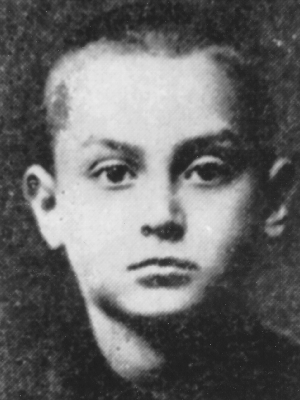
Yitskhok was the only child born to Rose and Elihu Rudashevski. Yitskhok's father worked as a typesetter for a well-known Yiddish newspaper. His mother worked as a seamstress. Yitskhok had a relatively comfortable childhood. He was part of a large, closely-knit and loving family. He lived in Vilna, the capital of Lithuania. Vilna had a large Jewish population and was a world center for Jewish culture and learning. In 1941, the city was home to over 80,000 Jews. Yitskhok completed one year of high school at the prestigious Realgymnasium. He was a good student and his favorite subjects were literature and history. He loved to read, and wrote as often as he could in his diary. He went hiking or to camp with his youth group.
When the Germans invaded Vilna in June 1941, Yitskhok was fourteen years old. The Germans immediately set about persecuting the city's Jews, and in July, took 35,000 men, women, and children to the Ponary forest, about 10 miles outside Vilna. Forced to dig their own graves, the Jews were massacred. In September, the remaining Jews were herded into two overcrowded, sealed-off ghettos. The smaller one was closed 46 days later, after its residents were murdered. Conditions were horrible in the remaining ghetto. There was little food, poor sanitation, and the residents were subject to random Nazi brutality and periodic roundups. Despite these conditions, underground cultural events were organized, newspapers were published, and various social welfare groups continued functioning. Yitskhok attended a clandestine school for two years. He joined various clubs including one that collected folklore. He continued to write in his diary, describing life in the ghetto.
The destruction of Vilna's Jewry continued, as the Nazis rounded up Jews and murdered them in the Ponary forest. A strong underground resistance group was formed, gathering weapons and planning for the defense of the ghetto. After the group was betrayed, many of its members escaped to the forest. In August 1943, as a prelude to their plan to empty the ghetto, the Nazis began sending the remaining Jews to Estonia. In September 1943, the Germans decided to murder those who were left. Yitskhok and his parents moved to a "hideout" in the attic of his uncle's home. They hid there with his uncle's family , along with five other people, for two weeks. In early October 1943, the Germans discovered the hideout. Sixteen year-old Yitskhok and the others were taken to the forest and murdered. One of Yitskhok's cousins managed to escape the massacre and joined the partisans in the surrounding forests. He returned to Vilna after the war and found Yitskhok's 204-page diary.

